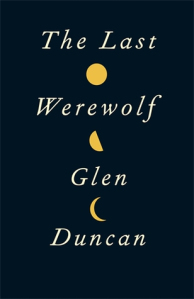Glen Duncan – "The Last Werewolf"
 Literary rejection fuels the heart of The Last Werewolf. No, not the heart of the grizzled old seen-it-all anti-hero Jake Marlowe. Literary rejection, it turns out, motivated Glen Duncan as he let this gripping story pour out.
Literary rejection fuels the heart of The Last Werewolf. No, not the heart of the grizzled old seen-it-all anti-hero Jake Marlowe. Literary rejection, it turns out, motivated Glen Duncan as he let this gripping story pour out.
Duncan was in a "foul mood," he said in an interview. He had written seven "overtly literary novels that had been read by virtually no one." And his agent let him know that his chance of finding a publisher for an eighth were "nil."
Yes, literary rejection.
I really had to laugh when I came across that interview with Duncan and think I better understood the seething, slow-burn feeling. Grrrr.
In the same interview, Duncan acknowledges that the "filmic antecedent" for The Last Werewolf is "An American Werewolf in London" with its similar mix of "horror, humour, sex, gore, pathos, moral quandary and believable love story."
That just about covers it, though Duncan of course doesn't tout his ability to marry a precise character with a powerful voice. As a reader devouring (sorry) The Last Werewolf, you are suddenly on the helpless end of a tractor beam.
The violence and sex are graphic. The descriptions are blunt in an unflashy way but also consistent with Jake Marlowe's view of the world. This is the way Jake views his whole odd life. He's jaded Jake, seen-it-all Jake, getting-tired-of-it-the-monthly-werewolf-thing Jake. He'd just as soon have another glass of old Macallan and a Camel Filter. Ending it all might be one option but he finds a reason to keep going. But they are coming after him, to wipe out the last werewolf so action here is Jake trying to stay one step ahead of his pursuers and trying to decide when to turn around and take them on. Or not. He's tired, he's turning 201 years old soon and he's prone to depression.
Because Jake is so grounded in human emotions, I felt completely connected with this particular werewolf's world-weary woes. He's wary of many things, particularly vampires, and this gives Duncan a chance to continue to stir the pot with wry tidbits about how life for this particular werewolf is going down. "This has been of the great vampiric contentions, that they constitute a civilization: They have art, culture, division of labour, political and legal systems. There's no lycanthropic parallel." But Marlowe has an explanation to cut werewolves some slack. "After a few transformations your human self starts to lose interest in books. Reading begins to give you a blood-brown headache. People describe you as laconic. Getting the sentences out feels like a giant impure labour. I've heard tell of howlers going decades barely uttering a word."
But for Jake, language is morality and his girl-du-jour Jacqueline helps Jake see that his "real curse" is that he can't stop caring about real beauty.
As he corners victims and stampedes women, we are shown his likable, smart and terribly analytic side, too. It's a delectable combination.
The plot rocks along–with leisurely intermissions here and there as Jake contemplates his situation or lies in bed with a woman. But it's the writing and imagery that kept me going. Snow falls with the "implacability of an Old Testament plague." Daybreak comes on like the "slow development of a daguerreotype." He gazes out on his city and "London goes about its business like a virile degenerate old man."
A compelling story told in a powerful voice, pumped up by a writer who ran smack into a brutal marketplace where his straight literary fiction had lost favor. (A sequel, however, is in the works…)
Filed under: Books











